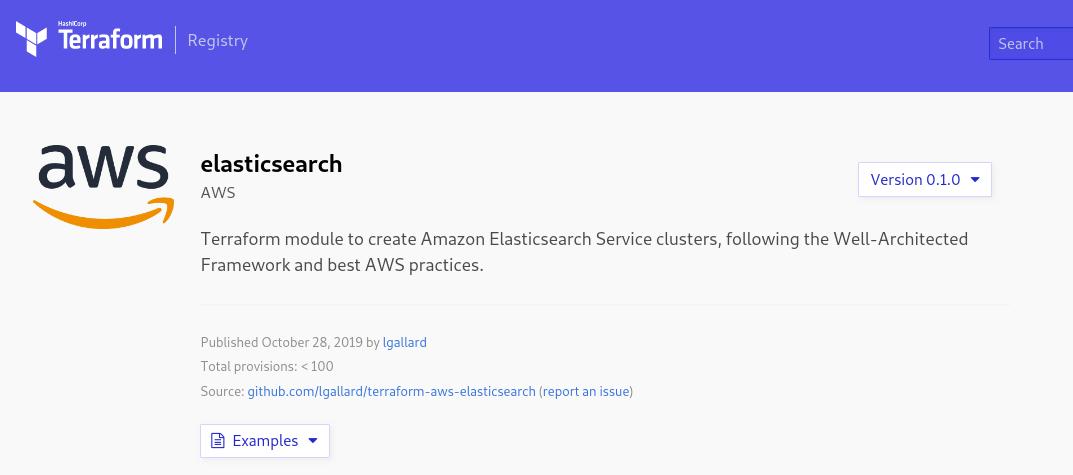Módulo de Terraform para Amazon Elasticsearch Service

Dejo por acá otro módulo de Terraform que acabo de publicar como código abierto, el cual permite crear clusters de Amazon Elasticsearch Service. El módulo está diseñado siguiendo las mejores prácticas y los principios del Well-Architected Framework de AWS.
Puedes verificar el módulo terraform-aws-elasticsearch en el Terraform Registry o clonarlo de Github
Si quieres echar un vistazo al módulo, también dejé el archivo README en esta publicación:
terraform-aws-elasticsearch
Terraform module to create Amazon Elasticsearch Service clusters, following the Well-Architected Framework and best AWS practices.
Amazon Elasticsearch Service is a fully managed service that makes it easy to deploy, operate, and scale Elasticsearch clusters in the AWS Cloud. Elasticsearch is a popular open-source search and analytics engine for use cases such as log analytics, real-time application monitoring, and clickstream analysis. With Amazon ES, you get direct access to the Elasticsearch APIs; existing code and applications work seamlessly with the service.
Examples
Check the examples folder where you can see how to configure a public ES cluster, and another example showing how to set it with VPC options.
Usage
You can use this module to create your Amazon ES cluster by defining each parameters blocks as follows:
module "aws_es" {
source = "git::https://github.com/lgallard/terraform-aws-elasticsearch.git"
domain_name = "elasticsearch_public"
elasticsearch_version = "7.1"
cluster_config = {
dedicated_master_enabled = "true"
instance_count = "3"
instance_type = "r5.large.elasticsearch"
zone_awareness_enabled = "true"
availability_zone_count = "3"
}
ebs_options = {
ebs_enabled = "true"
volume_size = "25"
}
encrypt_at_rest = {
enabled = "true"
kms_key_id = "alias/aws/es"
}
log_publishing_options = {
enabled = "true"
log_type = "INDEX_SLOW_LOGS"
}
advanced_options = {
"rest.action.multi.allow_explicit_index" = "true"
}
node_to_node_encryption_enabled = "true"
snapshot_options_automated_snapshot_start_hour = "23"
tags = {
Owner = "sysops"
env = "dev"
}
Note: You can also define the above ElasticSearch cluster using just the module variables. Instead of defining a cluster_config block (list of map), you can set each of the cluster_config_* variables, as shown below:
module "aws_es" {
source = "git::https://github.com/lgallard/terraform-aws-elasticsearch.git"
domain_name = "elasticsearch_public"
elasticsearch_version = "7.1"
cluster_config_dedicated_master_enabled = true
cluster_config_instance_count = "3"
cluster_config_instance_type = "r5.large.elasticsearch"
cluster_config_zone_awareness_enabled = "true"
cluster_config_availability_zone_count = "3"
ebs_options_ebs_enabled = true
ebs_options_volume_size = "25"
encrypt_at_rest_enabled = true
encrypt_at_rest_kms_key_id = "alias/aws/es"
log_publishing_options_enabled = true
log_publishing_options_log_type = "INDEX_SLOW_LOGS"
advanced_options = {
"rest.action.multi.allow_explicit_index" = "true"
}
node_to_node_encryption_enabled = "true"
snapshot_options_automated_snapshot_start_hour = "23"
tags = {
Owner = "sysops"
env = "dev"
}
Inputs
| Name | Description | Type | Default | Required |
|---|---|---|---|---|
| access_policies | IAM policy document specifying the access policies for the domain | string | "" |
no |
| advanced_options | Key-value string pairs to specify advanced configuration options. Note that the values for these configuration options must be strings (wrapped in quotes) or they may be wrong and cause a perpetual diff, causing Terraform to want to recreate your Elasticsearch domain on every apply | map(string) | {} |
no |
| cluster_config | Cluster configuration of the domain | map | {} |
no |
| cluster_config_availability_zone_count | Number of Availability Zones for the domain to use with | number | 3 |
no |
| cluster_config_dedicated_master_count | Number of dedicated master nodes in the cluster | number | 3 |
no |
| cluster_config_dedicated_master_enabled | Indicates whether dedicated master nodes are enabled for the cluster | bool | true |
no |
| cluster_config_dedicated_master_type | Instance type of the dedicated master nodes in the cluster | string | "r5.large.elasticsearch" |
no |
| cluster_config_instance_count | Number of instances in the cluster | number | 3 |
no |
| cluster_config_instance_type | Instance type of data nodes in the cluster | string | "r5.large.elasticsearch" |
no |
| cluster_config_zone_awareness_enabled | Indicates whether zone awareness is enabled. To enable awareness with three Availability Zones | bool | false |
no |
| cognito_options | Options for Amazon Cognito Authentication for Kibana | map | {} |
no |
| cognito_options_enabled | Specifies whether Amazon Cognito authentication with Kibana is enabled or not | bool | false |
no |
| cognito_options_identity_pool_id | ID of the Cognito Identity Pool to use | string | "" |
no |
| cognito_options_role_arn | ARN of the IAM role that has the AmazonESCognitoAccess policy attached | string | "" |
no |
| cognito_options_user_pool_id | ID of the Cognito User Pool to use | string | "" |
no |
| domain_name | Name of the domain | string | n/a | yes |
| ebs_enabled | Whether EBS volumes are attached to data nodes in the domain | bool | true |
no |
| ebs_options | EBS related options, may be required based on chosen instance size | map | {} |
no |
| ebs_options_iops | The baseline input/output (I/O) performance of EBS volumes attached to data nodes. Applicable only for the Provisioned IOPS EBS volume type | number | 0 |
no |
| ebs_options_volume_size | The size of EBS volumes attached to data nodes (in GB). Required if ebs_enabled is set to true | number | 10 |
no |
| ebs_options_volume_type | The type of EBS volumes attached to data nodes | string | "gp2" |
no |
| elasticsearch_version | The version of Elasticsearch to deploy. | string | "7.1" |
no |
| encrypt_at_rest | Encrypt at rest options. Only available for certain instance types | map | {} |
no |
| encrypt_at_rest_enabled | Whether to enable encryption at rest | bool | true |
no |
| encrypt_at_rest_kms_key_id | The KMS key id to encrypt the Elasticsearch domain with. If not specified then it defaults to using the aws/es service KMS key | string | "alias/aws/es" |
no |
| log_publishing_options | Options for publishing slow logs to CloudWatch Logs | map | {} |
no |
| log_publishing_options_cloudwatch_log_group_arn | iARN of the Cloudwatch log group to which log needs to be published | string | "" |
no |
| log_publishing_options_enabled | Specifies whether given log publishing option is enabled or not | bool | true |
no |
| log_publishing_options_log_type | A type of Elasticsearch log. Valid values: INDEX_SLOW_LOGS, SEARCH_SLOW_LOGS, ES_APPLICATION_LOGS | string | "INDEX\_SLOW\_LOGS" |
no |
| node_to_node_encryption | Node-to-node encryption options | map | {} |
no |
| node_to_node_encryption_enabled | Whether to enable node-to-node encryption | bool | true |
no |
| snapshot_options | Snapshot related options | map | {} |
no |
| snapshot_options_automated_snapshot_start_hour | Hour during which the service takes an automated daily snapshot of the indices in the domain | number | 0 |
no |
| tags | A mapping of tags to assign to the resource | map | {} |
no |
| vpc_options | VPC related options, see below. Adding or removing this configuration forces a new resource | map | {} |
no |
| vpc_options_security_group_ids | List of VPC Security Group IDs to be applied to the Elasticsearch domain endpoints. If omitted, the default Security Group for the VPC will be used | list | [] |
no |
| vpc_options_subnet_ids | List of VPC Subnet IDs for the Elasticsearch domain endpoints to be created in | list | [] |
no |
Outputs
| Name | Description |
|---|---|
| arn | Amazon Resource Name (ARN) of the domain |
| domain_id | Unique identifier for the domain |
| endpoint | Domain-specific endpoint used to submit index, search, and data upload requests |
| kibana_endpoint | Domain-specific endpoint for kibana without https scheme |
| vpc_options_availability_zones | If the domain was created inside a VPC, the names of the availability zones the configured subnet_ids were created inside |
| vpc_options_vpc_id | If the domain was created inside a VPC, the ID of the VPC |




